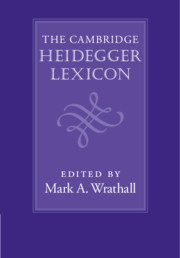Book contents
- The Cambridge Heidegger Lexicon
- Series page
- The Cambridge Heidegger Lexicon
- Copyright page
- Contents
- Contributors
- Preface
- Acknowledgments
- Using the Lexicon
- Chronology of Martin Heidegger
- Abbreviations for Heidegger’s Works
- A
- B
- C
- D
- E
- F
- G
- H
- I
- J
- K
- L
- M
- N
- O
- P
- R
- S
- T
- 197. Technology (Technik)
- 198. Temporality (Temporalität,Zeitlichkeit)
- 199. Thematic (thematisch)
- 200. There (Da)
- 201. Thing (Ding)
- 202. Thinking (Denken)
- 203. Thrownness (Geworfenheit)
- 204. Time (Zeit)
- 205. Topology (Topologie)
- 206. Transcendence (Transzendenz)
- 207 Transition (Übergang)
- 208. Translation (Übersetzung)
- 209. Transparency (Durchsichtigkeit)
- 210. Truth (Wahrheit)
- 211. Turn (Kehre)
- U
- V
- W
- German–English Glossary
- Bibliography
- Index
210. - Truth (Wahrheit)
from T
Published online by Cambridge University Press: 17 April 2021
- The Cambridge Heidegger Lexicon
- Series page
- The Cambridge Heidegger Lexicon
- Copyright page
- Contents
- Contributors
- Preface
- Acknowledgments
- Using the Lexicon
- Chronology of Martin Heidegger
- Abbreviations for Heidegger’s Works
- A
- B
- C
- D
- E
- F
- G
- H
- I
- J
- K
- L
- M
- N
- O
- P
- R
- S
- T
- 197. Technology (Technik)
- 198. Temporality (Temporalität,Zeitlichkeit)
- 199. Thematic (thematisch)
- 200. There (Da)
- 201. Thing (Ding)
- 202. Thinking (Denken)
- 203. Thrownness (Geworfenheit)
- 204. Time (Zeit)
- 205. Topology (Topologie)
- 206. Transcendence (Transzendenz)
- 207 Transition (Übergang)
- 208. Translation (Übersetzung)
- 209. Transparency (Durchsichtigkeit)
- 210. Truth (Wahrheit)
- 211. Turn (Kehre)
- U
- V
- W
- German–English Glossary
- Bibliography
- Index
Summary
According to heidegger, the philosophical tradition, beginning with Plato and Aristotle, has misunderstood the essence of truth by conceiving of it as accuracy, correctness, or rightness (Richtigkeit), or more specifically as a kind of correspondence or agreement (Übereinstimmung) between one thing and another – a belief and a fact, a proposition and a state of affairs, more generally the mind and the world – an idea captured in Thomas Aquinas’ famous thesis that Veritas est adaequatio rei et intellectus (in addition to adaequatio, Aquinas also sometimes used the words conformitas and correspondentia). Although these conceptions of truth have come to seem obvious, Heidegger believes that poets and thinkers did not always conceive of truth as correctness or correspondence, and moreover that a different, more fundamental notion of truth persists in our ordinary understanding of our relation to the world.
- Type
- Chapter
- Information
- The Cambridge Heidegger Lexicon , pp. 777 - 782Publisher: Cambridge University PressPrint publication year: 2021

